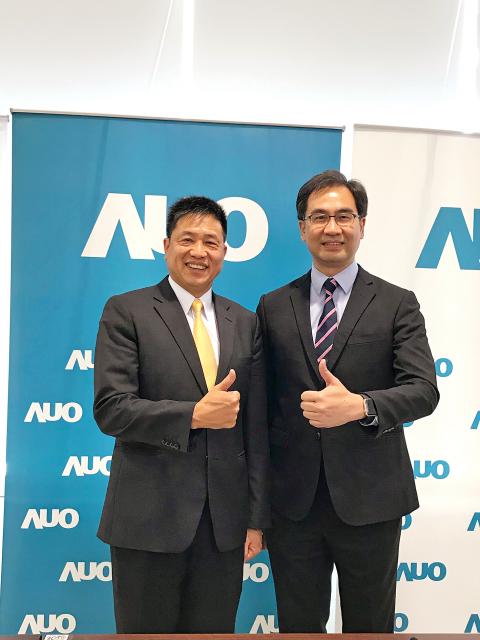AU Optronics Corp (AUO, 友達光電), the nation’s second-largest LCD panel maker, expects the downward pressure on prices of LCD TV panels to ease in the second half of this year, thanks to improving inventories and rising demand ahead of the peak season.
Since the beginning of this year, prices for TV panels, such as 32-inch and 40-inch screens, have dropped more than 20 percent, as TV vendors continued to scale down orders to level off their excessive stockpiles, the company said.
“It is unlikely that panel prices will hover at below-cost levels for a long period. The market will balance out eventually,” AUO chairman Paul Peng (彭双浪) told a media briefing after the company’s annual shareholders’ meeting in Taichung on Friday last week.

Photo: Chen Mei-ying, Taipei Times
As the LCD TV market is to enter its peak season in the third and fourth quarters, price declines should slow and the price of certain types of panels might even pick up, Peng said.
The ongoing FIFA World Cup would help stimulate TV sales, while most TV vendors are close to reducing their panel inventories to healthy levels, he said.
Those favorable factors would help boost AUO’s business in the second half of the year, he added.
Commenting on the competition from Chinese peers, Peng said that AUO has been developing panels with added value, such as those used in cars and the commercial sector, which would enable the company to better manage downturns and price competition.
Revenue from panels used in cars is predicted to grow by a double-digit percentage this year, as automakers are equipping new car models with bigger screens of 12 to 13 inches, Peng said.
More than half of the company’s revenue is generated by value-added panels, he said.
The company’s healthy financial status would give AUO more leeway to cope with escalating competition, Peng said.
AUO last year saw its net profit grow to a 10-year high of NT$32.36 billion (US$1.08 billion). The company reduced its net debt ratio to 4.8 percent last quarter, from 18.5 percent a year earlier, the company’s financial statement showed. It has accumulated NT$97.12 billion in cash and cash equivalents.
As for products, AUO said it would ship its first mini-LED panels — which are used in premium monitors for gaming PCs — in the second half of the year.
After that, it is scheduled to ship mini-LED panels used in notebook computers, the company said, adding that it is also developing mini-LED panels for mobile phones and virtual-reality devices.
Mini-LED panels have a similar brightness, color contrast and response time to OLED panels, but at more affordable prices.
AUO shareholders on Friday approved the distribution of a cash dividend of NT$1.5 per common share, which represented a payout ratio of 44.64 percent, based on earnings per share of NT$3.36 last year.

GROWING OWINGS: While Luxembourg and China swapped the top three spots, the US continued to be the largest exposure for Taiwan for the 41st consecutive quarter The US remained the largest debtor nation to Taiwan’s banking sector for the 41st consecutive quarter at the end of September, after local banks’ exposure to the US market rose more than 2 percent from three months earlier, the central bank said. Exposure to the US increased to US$198.896 billion, up US$4.026 billion, or 2.07 percent, from US$194.87 billion in the previous quarter, data released by the central bank showed on Friday. Of the increase, about US$1.4 billion came from banks’ investments in securitized products and interbank loans in the US, while another US$2.6 billion stemmed from trust assets, including mutual funds,

Micron Memory Taiwan Co (台灣美光), a subsidiary of US memorychip maker Micron Technology Inc, has been granted a NT$4.7 billion (US$149.5 million) subsidy under the Ministry of Economic Affairs A+ Corporate Innovation and R&D Enhancement program, the ministry said yesterday. The US memorychip maker’s program aims to back the development of high-performance and high-bandwidth memory chips with a total budget of NT$11.75 billion, the ministry said. Aside from the government funding, Micron is to inject the remaining investment of NT$7.06 billion as the company applied to participate the government’s Global Innovation Partnership Program to deepen technology cooperation, a ministry official told the

AI TALENT: No financial details were released about the deal, in which top Groq executives, including its CEO, would join Nvidia to help advance the technology Nvidia Corp has agreed to a licensing deal with artificial intelligence (AI) start-up Groq, furthering its investments in companies connected to the AI boom and gaining the right to add a new type of technology to its products. The world’s largest publicly traded company has paid for the right to use Groq’s technology and is to integrate its chip design into future products. Some of the start-up’s executives are leaving to join Nvidia to help with that effort, the companies said. Groq would continue as an independent company with a new chief executive, it said on Wednesday in a post on its Web

Taiwan Semiconductor Manufacturing Co (TSMC, 台積電), the world’s leading advanced chipmaker, officially began volume production of its 2-nanometer chips in the fourth quarter of this year, according to a recent update on the company’s Web site. The low-key announcement confirms that TSMC, the go-to chipmaker for artificial intelligence (AI) hardware providers Nvidia Corp and iPhone maker Apple Inc, met its original roadmap for the next-generation technology. Production is currently centered at Fab 22 in Kaohsiung, utilizing the company’s first-generation nanosheet transistor technology. The new architecture achieves “full-node strides in performance and power consumption,” TSMC said. The company described the 2nm process as